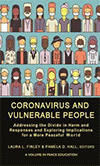
Coronavirus and Vulnerable People
Addressing the Divide in Harm and Responses and Exploring Implications for a More Peaceful World
Edited by:
Laura L. Finley, Barry University
Pamela D. Hall, Barry University
A volume in the series: Peace Education. Editor(s): Laura L. Finley, Barry University.
Published 2022
Drawing from many disciplinary areas, this edited volume explores how the Coronavirus pandemic has disproportionately harmed vulnerable and marginalized people in the U.S. Chapters address harm to people of color that exacerbated structural racism and harm to low-wage workers that highlighted existing inequalities. In addition, the volume provides strategies that have been successful in mitigating these harms and recommendations for a post- pandemic more peaceful and just future.
CONTENTS
Acknowledgments and Dedication, Laura L. Finley and Pamela D. Hall. Introduction, Laura L. Finley. SECTION I. COVID-19 Under the Reign of Neoliberalism: Challenges and Possibilities in the United States, Luigi Esposito. Conjure, Digital Life, and Survival, Alecia Deon. Remembering Our Power and Rightful Position to Transform Our Present Reality and Enjoy Peace, JoHanna Thompson. The Coronavirus and Vulnerable Immigrants in the United States—Essential, Yet Disposable, Jordana A. Hart. A COVID19 Moment: Haitian Mental Health Clinicians Reflecting on Grief and Loss, Fanya Jabouin Monnay and Karine Champagne. Telehealth is Not “That Bad”, LaTasha Russel. The Voice of the Nurse: At the Very Front of All Frontline Workers, Mureen Shaw. The Precarious Position of Adjunct Professors, Christian A.I. Schlaerth. Pandemic, Pedagogy and Positive Peace: Equity in Education During COVID-19, Wim Laven. A Journal of the Pandemic Year: Teaching at the Margins in the Age of Novel Coronavirus, G. Michelle Collins-Sibley. SECTION II. Overcoming Intergenerational Trauma During the Pandemic of 2020, Pamela D. Hall and Alexandra Lavado. Racism, the Real Cause of the Racial Inequality of Coronavirus, Roni Bennett. COVID-19, Colonialism and Indigenous People, Laura L. Finley. The Association of Black Psychologists-South Florida Chapter and COVID-1D, Pamela D. Hall, T. Conswello Davis, and Jordan M. Pate-Garrett. Miami-Dade Economic Advocacy Trust (MDEAT) Youth Development Division: Teen Court and COVID-19, Jordan M. Pate-Garrett. Reconceptualizing the American Dream for Racial/Ethnic Minorities During COVID-19: The Intersection of Health and Mental Health Disparities, Elizabeth F. Louis. Soufrans Ayisyen: An Emerging Theoretical Construct of Haitian Suffering, Guy C. Jeanty. Reimagining Soufrans Ayisyen (Haitian Suffering): Cultural and Clinical Narratives During the COVID-19 Pandemic, Pascale Denis, Elizabeth F. Louis, and Charlene Désir. Vulnerable Populations and COVID-19: The Challenges of Black, Brown, Indigenous, and People of Color During a 100-Year Pandemic, Ruban Roberts. Kemetic Yoga: Coping, Healing, Wellness, T. Conswello Davis. Radical Potentials in a Time of Crisis: Whose Vulnerability Is It Anyway? Mark Lance and Matt Meyer. Epilogue, Pamela D. Hall. Appendix: Recommended Resources. About the Editors and Authors.
-
Paperback978-1-64802-883-0
Web price: $45.04 (Reg. 52.99)
-
Hardcover978-1-64802-884-7
Web price: $80.74 (Reg. 94.99)
- eBook978-1-64802-885-4

- HEA000000 - HEALTH & FITNESS: General
- EDU037000 - EDUCATION: Research
- EDU041000 - EDUCATION: Distance & Online Education
-
 Difficult Discussions
Issues and Ideas for Engaging College Students in Peace and Justice Topics
Difficult Discussions
Issues and Ideas for Engaging College Students in Peace and Justice Topics
-
 Experiential Learning in Higher Education
Issues, Ideas, and Challenges for Promoting Peace and Justice
Experiential Learning in Higher Education
Issues, Ideas, and Challenges for Promoting Peace and Justice
-
 Humanities Perspectives in Peace Education
Re-Engaging the Heart of Peace Studies
Humanities Perspectives in Peace Education
Re-Engaging the Heart of Peace Studies
-
 Lessons for Creating a Culture of Character and Peace in Your Classroom
A Playbook for Teachers
Lessons for Creating a Culture of Character and Peace in Your Classroom
A Playbook for Teachers
-
 Peace is Everyone's Business
Peace is Everyone's Business
-
 Teaching Peace Through Popular Culture
2nd Edition
Teaching Peace Through Popular Culture
2nd Edition
-
 The New Peace Linguistics and the Role of Language in Conflict
The New Peace Linguistics and the Role of Language in Conflict

